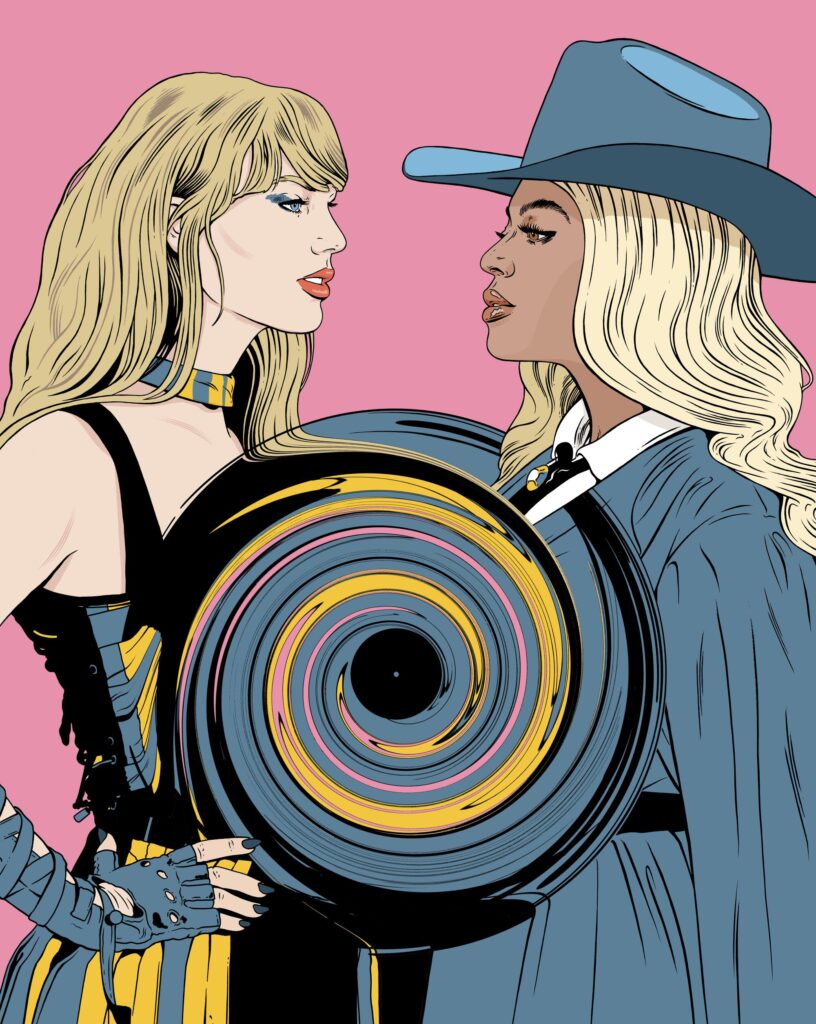(Louise Pomeroy For The Times)
A decade and a half ago, Beyoncé and Taylor Swift went head to head for album of the year at the 52nd Grammy Awards in January 2010.
It was each woman’s first time competing for the Grammys’ most prestigious prize — the one that embodies the Recording Academy’s closely held ideas about craftsmanship and tradition — and as they waited for Carlos Santana to call out the winner’s name, both wore expressions of nervous expectation.
Swift, then 20, took album of the year that night with her sophomore LP, the 10-times-platinum “Fearless” — in the process becoming the youngest person in Grammys history to carry the category. (Billie Eilish set a new record when she won at age 18 in 2020.) Since then, Swift has won the academy’s flagship award three more times, including earlier this year, when her victory with “Midnights” broke a tie with Frank Sinatra, Paul Simon and Stevie Wonder to make her the first artist to collect four album of the year trophies.
Beyoncé, meanwhile, lost album of the year three more times — a vexing outcome for music’s most intellectually ambitious superstar.

Now, for the first time since 2010, these era-defining giants are set to vie for album of the year again, Swift with “The Tortured Poets Department” and Beyoncé with “Cowboy Carter,” when nominations for the 67th Grammys are revealed on Nov. 8. Not only that, but Swift’s “Fortnight” and Beyoncé’s “Texas Hold ’Em” — each a No. 1 single on Billboard’s Hot 100 with hundreds of millions of Spotify streams — are likely to face off for both record of the year and song of the year.
The prospect of an epic rematch between the two would no doubt please officials at the academy, who are always searching for ways to entice viewers to tune into a televised awards show in the age of social media. After all, Bey-and-Tay moments have been reliable magnets for attention since the 2009 MTV Video Music Awards, when Kanye West famously interrupted an acceptance speech by Swift to declare that Beyoncé deserved the prize for best female video.
Last year, the women posed for photos that instantly went viral when each appeared at the other’s concert film premiere. And who can forget the hysteria that erupted as a result of (ultimately disproven) rumors that the two had agreed to join forces behind Vice President Kamala Harris at August’s Democratic National Convention?
Yet the showdown would also emphasize certain fault lines in the Recording Academy and in the music business at large involving race, genre and authenticity — and not for the first time. Grammy watchers will remember an earlier battle between Beyoncé’s “Renaissance” and Adele’s “30” in 2023, which itself followed Adele’s tearful proclamation at the 2017 Grammys that she couldn’t rightfully accept album of the year for her blockbuster “25” knowing that her win had come at the expense of Beyoncé’s epochal “Lemonade.”
The point Adele was making is that, by denying Beyoncé the record industry’s equivalent of a best picture Oscar, the academy had failed to properly reward the more important work, just as it had when Beck’s “Morning Phase” beat Beyoncé’s self-titled LP for album of the year in 2015 — and, indeed, just as it would at the 2023 ceremony when “Renaissance” (and “30”) lost to Harry Styles’ “Harry’s House” during a show in which Beyoncé otherwise became the winningest artist in Grammys history.
Beyoncé’s husband, Jay-Z, acknowledged that paradox at this past February’s show in a speech in which he pointed out that his wife “has more Grammys than everyone and never won album of the year. So even by your own metrics, that doesn’t work. Think about that: The most Grammys — never won album of the year. That doesn’t work.”
Jay-Z didn’t mention Swift in his speech, but on a night when she took her fourth album of the year trophy, it wasn’t hard to wonder why her music consistently draws that high-level recognition while Beyoncé’s merits smaller-scale awards in various genre categories. The discrepancy reflects the academy’s longstanding preference for a singer-songwriter’s approach (like the one Swift takes) over the more collaborative process Beyoncé uses to make records that can incorporate the work of dozens of musicians; it also suggests that Grammy voters view Swift as more of an auteur than they do Beyoncé, which if true may help explain why only three Black women — Natalie Cole, Whitney Houston and Lauryn Hill — have won album of the year in the Grammys’ 6 1/2 decades.
What makes the current Grammys race particularly interesting is that “Cowboy Carter” is more or less a country album, with plenty of the kind of hand-played instrumentation that Swift deployed all those years ago on “Fearless.” (“The Tortured Poets Department” plays like a cross between the synthed-up “Midnights” and Swift’s rootsy “Folklore.”) Setting aside “Cowboy Carter’s” many worthy fascinations, the troubled optics of withholding an album of the year nomination — for an LP that does so many established Grammy things — means that Beyoncé is all but certain to receive one next month.
Still, that leaves open the question of how she’ll fare in the country categories — a situation made only more fraught by the fact that “Cowboy Carter,” which Beyoncé has said was inspired by the frosty reception she got as a performer at the 2016 Country Music Assn. Awards, was entirely shut out for nods at this year’s edition of that Nashville ceremony.
Beyoncé’s complicated history in album of the year means that all eyes will be on that prize when Grammy nominations are announced. But this time the story of her place in the business will be told further down the ballot as well.

